|
|
|
Sort Order |
|
|
|
Items / Page
|
|
|
|
|
|
|
| Srl | Item |
| 1 |
ID:
163307
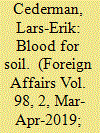

|
|
|
|
|
| Summary/Abstract |
Since the French Revolution, nationalism—the idea that state borders should coincide with national communities—has constituted the core source of political legitimacy around the world. As nationalism spread from western Europe in the early nineteenth century, it became increasingly ethnic in nature. In places where the state and the nation did not match up, such as Germany, Italy, and most of eastern Europe, the nation tended to be defined in terms of ethnicity, which led to violent processes of unification or secession. At the beginning of the twentieth century, ethnic nationalism came to disrupt political borders even more, leading to the breakup of multiethnic empires, including the Habsburg, Ottoman, and Russian ones. By changing the size of Europe’s political units, this undermined the balance of power and contributed to two world wars
|
|
|
|
|
|
|
|
|
|
|
|
|
|
|
|
| 2 |
ID:
173129
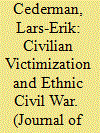

|
|
|
|
|
| Summary/Abstract |
While many studies provide insights into the causes of wartime civilian victimization, we know little about how the targeting of particular segments of the civilian population affects the onset and escalation of armed conflict. Previous research on conflict onset has been largely limited to structural variables, both theoretically and empirically. Moving beyond these static approaches, this article assesses how the state-led targeting of specific ethnic groups affects the likelihood of ethnic conflict onset and the evolution of conflicts once they break out. Relying on a new data set with global coverage that captures the ethnic identity of civilian victims of targeted violence, we find evidence that the state-led civilian victimization of particular ethnic groups increases the likelihood that the latter become involved in ethnic civil war. We also find tentative, yet more nuanced, evidence that ethnic targeting by state forces affects the escalation of ongoing conflicts.
|
|
|
|
|
|
|
|
|
|
|
|
|
|
|
|
| 3 |
ID:
053514
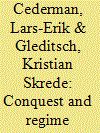

|
|
|
| 4 |
ID:
098409
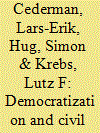

|
|
|
|
|
| Publication |
2010.
|
| Summary/Abstract |
The hypothesis that democratization triggers political violence has been proposed repeatedly in the quantitative literature, but it remains controversial with respect to both interstate and civil wars. Current empirical research continues to be afflicted by methodological and data problems related to the measurement of democracy and the task of detecting changes in such scores. In order to gain further clarity into the link between democratization and civil war, the current study introduces a new period-finding algorithm that is able to detect periods of democratization and autocratization. This allows for a more flexible way of finding directional changes in governance indicators than is possible with the rigid lag structures commonly employed in previous studies. When regressed on various measures of civil-war onset, the indicator for the initiation of a period of democratization has a strong and robust effect on conflict even in the presence of static measures of regime type. The same applies to autocratization, but its impact is much more sudden than that of democratization. Moreover, we find that the democratization effect is limited to governmental rather than territorial conflicts. Further research will be needed to confirm these results in terms of the relevant causal mechanisms, especially in ethno-nationalist civil wars.
|
|
|
|
|
|
|
|
|
|
|
|
|
|
|
|
| 5 |
ID:
083135
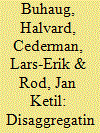

|
|
|
|
|
| Publication |
2008.
|
| Summary/Abstract |
Contemporary conflict research usually measures the influence of ethnicity on conflict by capturing ethnic constellations as country-based indices, such as ethnic fractionalization or polarization. However, such aggregated measures are likely to conceal the actual operation of actor-specific mechanisms. In this article, therefore, we introduce a disaggregated model that measures ethnic groups' access to power. We do so by disaggregating both ethnicity and conflict to the level of explicitly geo-coded center-periphery dyads. This procedure allows us to measure the power balance between politically excluded ethnic groups and dominant actors in terms of group sizes, distances between the center and the periphery, and the roughness of the latter's terrain. We rely on geographic information systems (GIS) to compute demographic and ethno-geographic variables. The dyadic analysis enables us to show that exclusion of powerful ethnic minorities increases the likelihood of conflict considerably. In addition, we show that the risk of conflict is positively associated with the extent of rough terrain in the peripheral group's home region and its distance from the political center
|
|
|
|
|
|
|
|
|
|
|
|
|
|
|
|
| 6 |
ID:
155783
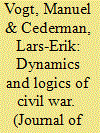

|
|
|
|
|
| Summary/Abstract |
This article reviews the literature on civil war. We focus on the most recent period of scholarly activity, beginning in the early 2000s when the publication of prominent quantitative studies triggered a surge in the empirical research of civil war as a well-defined conceptual category. We identify three explanatory logics that have dominated much of this literature and that view civil wars as a consequence of greed, grievances, and opportunities, respectively. We evaluate the arguments and findings of these theoretical approaches with respect to each of the main phases of war: outbreak, wartime dynamics, conflict termination, and postwar recovery. The article concludes by identifying key challenges confronting future civil war research. In particular, we emphasize the continuing need to advance theories that bridge the main explanatory logics as well as the different phases of conflict. Researchers should also pay more attention to defining the appropriate spatiotemporal scope of their studies.
|
|
|
|
|
|
|
|
|
|
|
|
|
|
|
|
| 7 |
ID:
055264
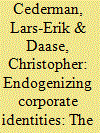

|
|
|
| 8 |
ID:
112511
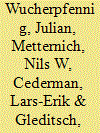

|
|
|
|
|
| Publication |
2012.
|
| Summary/Abstract |
Previous research has focused primarily on how ethnicity may trigger civil war, and its effect on conflict duration remains disputed. Rather than treating conflict as a direct consequence of ethnic cleavages, the authors argue that ethnicity per se does not affect civil war duration. Instead, its effect depends on its relationship to political institutions. They employ a dyadic approach that emphasizes the political context in which both government leaders and nonstate challengers can capitalize on the ascriptive nature of ethnicity. They show that although states can initially benefit from politicizing ethnic relations, once violent conflict breaks out, such policies may backfire on the government and make it difficult for incumbent governments to accept settlements that could terminate conflicts. Past policies of ethnic exclusion also benefit rebel organizations fighting the government, since the resulting grievances increase collective group solidarity and render individual fighters more cost tolerant. Using a new data set that codes the nexus between rebel organizations and ethnic groups, as well as information on ethnopolitical exclusion, the authors find considerable support for their propositions.
|
|
|
|
|
|
|
|
|
|
|
|
|
|
|
|
| 9 |
ID:
090989
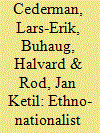

|
|
|
|
|
| Publication |
2009.
|
| Summary/Abstract |
Previous quantitative research on ethnic civil war relies on macro-level proxies in an attempt to specify the conditions under which ethnic minorities rebel. Going beyond an exclusive focus on minorities, the present study employs Geographic Information Systems (GIS) as a way to model ethnic center-periphery dyads that confront governments with excluded groups. We construct and analyze a new dataset of geo-referenced politically relevant ethnic groups, covering the entire world during the period from 1951 through 2005. Our results show that the conflict probability of marginalized groups increases with the demographic power balance compared to the group(s) in power. Furthermore, the risk of conflict increases with the distance from the group to the capital, and the roughness of the terrain in the group's settlement area. We also find that while the results for demographic group strength hold for all ethnic civil wars, the geographic factors apply for territorial ethnic conflicts only.
Previous quantitative research on ethnic civil war relies on macro-level proxies in an attempt to specify the conditions under which ethnic minorities rebel. Going beyond an exclusive focus on minorities, the present study employs Geographic Informat
|
|
|
|
|
|
|
|
|
|
|
|
|
|
|
|
| 10 |
ID:
088896
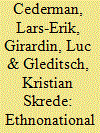

|
|
|
|
|
| Publication |
2009.
|
| Summary/Abstract |
Although the case-based literature suggests that kin groups are prominent in ethnonationalist conflicts, quantitative studies of civil war onset have both overaggregated and underaggregated the role of ethnicity, by looking at civil war at the country level instead of among specific groups and by treating individual countries as closed units, ignoring groups' transnational links. In this article the authors integrate transnational links into a dyadic perspective on conflict between marginalized ethnic groups and governments. They argue that transnational links can increase the risk of conflict as transnational kin support can facilitate insurgencies and are difficult for governments to target or deter. The empirical analysis, using new geocoded data on ethnic groups on a transnational basis, indicates that the risk of conflict is high when large, excluded ethnic groups have transnational kin in neighboring countries, and it provides strong support for the authors' propositions on the importance of transnational ties in ethnonationalist conflict.
|
|
|
|
|
|
|
|
|
|
|
|
|
|
|
|
| 11 |
ID:
065812
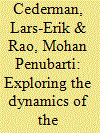

|
|
|
| 12 |
ID:
180669
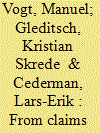

|
|
|
|
|
| Summary/Abstract |
Do radical political demands increase the risk of ethnic civil conflict? And why do ethnic movements make radical demands in the first place? We contend that when movements are fragmented, individual organizations use far-reaching claims relative to the status quo to attract attention from the government, boost intra-organizational discipline, and outbid rivals. Yet, such radical claims also increase the risk of conflict escalation. We test our arguments at both the ethnic group and organizational levels, using a new dataset on ethno-political organizations and their political demands. Our results show that the scope of demands increases the more organizations exist within an ethnic movement and that radical demands increase the risk of civil conflict onset. This effect is specific to the dyadic government-movement interaction, irrespective of other ethnic groups in the country. Moreover, at the organizational level, radicalization in demands increases the likelihood that an organization becomes engaged in civil conflict.
|
|
|
|
|
|
|
|
|
|
|
|
|
|
|
|
| 13 |
ID:
095374
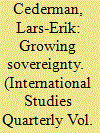

|
|
|
| 14 |
ID:
110540


|
|
|
|
|
| Publication |
2011.
|
| Summary/Abstract |
Contemporary research on civil war has largely dismissed the role of political and economic grievances, focusing instead on opportunities for conflict. However, these strong claims rest on questionable theoretical and empirical grounds. Whereas scholars have examined primarily the relationship between individual inequality and conflict, we argue that horizontal inequalities between politically relevant ethnic groups and states at large can promote ethnonationalist conflict. Extending the empirical scope to the entire world, this article introduces a new spatial method that combines our newly geocoded data on ethnic groups' settlement areas with spatial wealth estimates. Based on these methodological advances, we find that, in highly unequal societies, both rich and poor groups fight more often than those groups whose wealth lies closer to the country average. Our results remain robust to a number of alternative sample definitions and specifications.
|
|
|
|
|
|
|
|
|
|
|
|
|
|
|
|
| 15 |
ID:
112777
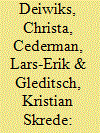

|
|
|
|
|
| Publication |
2012.
|
| Summary/Abstract |
Case study evidence suggests that inequality between regions in federations affects the risk of secessionist conflict. However, the conventional quantitative literature on civil war has found little support for a link between economic inequality and civil war. We argue that this seeming discrepancy in part stems from differences in the conceptualization of inequality and its operationalization, which has focused on individual-level wealth differences. In contrast, we investigate regional-level inequality, which is more readily applicable to understanding possible incentives for internal conflict. We adopt a spatial approach, based on new geo-coded data on administrative units in 31 federal states between 1991 and 2005, economic wealth, and ethnic settlements, and demonstrate strong evidence that regional inequality affects the risk of secessionist conflict. The results indicate that in highly unequal federations, both relatively developed and underdeveloped regions are indeed more likely to be involved in secessionist conflict than regions close to the country average. In addition, we provide evidence that exclusion from central state power as well as ethnic groups' access to regional institutions are associated with an increased risk for secessionist conflict. The findings on inequality remain robust even when controlling for other confounding factors such as country GDP, population and war history.
|
|
|
|
|
|
|
|
|
|
|
|
|
|
|
|
| 16 |
ID:
141710
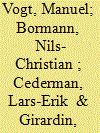

|
|
|
|
|
| Summary/Abstract |
This article introduces the new Family of Ethnic Power Relations (EPR) data sets, version 2014, which is the latest in a series of data sets on ethnicity that have stimulated civil war research in the past decade. The EPR Family provides data on ethnic groups’ access to state power, their settlement patterns, links to rebel organizations, transborder ethnic kin relations, and intraethnic cleavages. The new 2014 version does not only extend the data set’s temporal coverage from 2009 to 2013, but it also offers several new features, such as a new measure of regional autonomy that is independent of national-level executive power and a new data set component coding intraethnic identities and cleavages. Moreover, for the first time, detailed documentation of the EPR data is provided through the EPR Atlas. This article presents these novelties in detail and compares the EPR Family 2014 to the most relevant alternative data sets on ethnicity.
|
|
|
|
|
|
|
|
|
|
|
|
|
|
|
|
| 17 |
ID:
090987
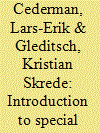

|
|
|
|
|
| Publication |
2009.
|
| Summary/Abstract |
We introduce the contributions to this special issue on "Disaggregating Civil War." We review the problems arising from excessive aggregation in studies of civil war, and outline how disaggregation promises to provide better insights into the causes and dynamics of civil wars, using the articles in this special issue as examples. We comment on the issue of the appropriate level of disaggregation, lessons learned from these articles, and issues for further research.
We introduce the contributions to this special issue on "Disaggregating Civil War." We review the problems arising from excessive aggregation in studies of civil war, and outline how disaggregation promises to provide better insights into the causes
|
|
|
|
|
|
|
|
|
|
|
|
|
|
|
|
| 18 |
ID:
152411
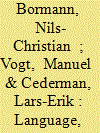

|
|
|
|
|
| Summary/Abstract |
Are certain ethnic cleavages more conflict-prone than others? While only few scholars focus on the contents of ethnicity, most of those who do argue that political violence is more likely to occur along religious divisions than linguistic ones. We challenge this claim by analyzing the path from linguistic differences to ethnic civil war along three theoretical steps: (1) the perception of grievances by group members, (2) rebel mobilization, and (3) government accommodation of rebel demands. Our argument is tested with a new data set of ethnic cleavages that records multiple linguistic and religious segments for ethnic groups from 1946 to 2009. Adopting a relational perspective, we assess ethnic differences between potential challengers and the politically dominant group in each country. Our findings indicate that intrastate conflict is more likely within linguistic dyads than among religious ones. Moreover, we find no support for the thesis that Muslim groups are particularly conflict-prone.
|
|
|
|
|
|
|
|
|
|
|
|
|
|
|
|
| 19 |
ID:
065801
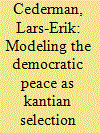

|
|
|
| 20 |
ID:
152302
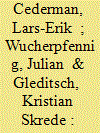

|
|
|
|
|
| Summary/Abstract |
Many scholars have detected a decrease of political violence, but the causes of this decline remain unclear. As a contribution to this debate, we revisit the controversy over trends in conflict after the end of the Cold War. While many made ominous predictions of surging ethnic warfare, Gurr presented evidence of a pacifying trend since the mid-1990s and predicted a further decline in ethnic conflict in an article on ‘the waning of ethnic war’. Leveraging more recent data on ethnic groups and their participation in ethnic civil wars, this study evaluates if Gurr was right about the decline of ethnic conflict, and if he was right for the right reasons. We assess whether an increase in governments’ accommodative policies toward ethnic groups can plausibly account for a decline in ethnic civil war. Our findings lend considerable support to an account of the pacifying trend that stresses the granting of group rights, regional autonomy, and inclusion in power-sharing, as well as democratization and peacekeeping.
|
|
|
|
|
|
|
|
|
|
|
|
|
|
|
|
|
|
|
|
|